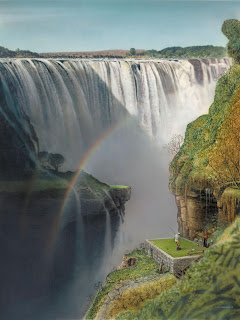1 – Victoria Falls (168 yards, par 3)
The confident player may go for the green but the tee shot must be struck with crisp authority in order to avoid perhaps considerable inconvenience in the depths which separate the tee from the green.
Loyal H. "Bud" Chapman (1923–2020) var pilot under kriget, sedan golfare och konstnär. Han blev överlägset mest känd för de akvareller med "omöjliga golfhål" han målade 1972–1982, och som blev mäkta populära i branschen. Naturligtvis dök det då och då upp folk som ville spela det ena eller andra hålet, vilket roade Chapman mer än något annat.
Jag såg tavlorna för länge sedan i Det Bästa och tänkte "jaha, det är så golf ser ut" – på den tiden kunde jag ännu mindre om golf än nu för tiden, och det vill inte säga lite. Möjligen var mitt skeptiska sinne heller inte fullt utvecklat.
Här är mina favoriter, kompletta med Chapmans beskrivningar.
4 – Grand Canyon (287 yards, par 4)
Short and straight, but nevertheless demanding. The long hitter can gain the green with his drive and indeed there has been some argument among the arrogant as to whether a slight left to right fade is preferable to a straight right to left draw. However, most play two irons to the green and are satisfied with par and an occasional birdie.
7 – Desert Winds Municipal Golf Course (39 yards, par 3)
Short but deceptively difficult, involving a 682 yard descent through often dramatic changes in temperature and winds. Indeed, the weather factor can be absolutely damnable making club selection difficult and crucial. Depending on wind direction, tee shots may be stroked lightly with a putter or thunderously with a driver. The imbedded ball applies on this hole.
8 – Mauna Pele (435 yards, par 4)Hawaii may be paradise to many, but many's the golfer who know this hole as "The Jaws of Hell." Fiery destruction awaits on all sides for the errant shot. But the bold drive that is well struck directly toward the furnace can catch strong updrafts which actually can carry it to the green. Balls that are scorched and heated out-of-round may be replaced.
9 – S:t Ian's Imperial & Ancient Golf Course (687 yards, par 5)A stern finish to one of the world’s legendary courses. There is little to say that is not readily apparent. Great distance, great accuracy and great finesse are crucial. The green, 160 feet above the sea, sits cheek by jowl with a 600-year-old clubhouse that was once a Scottish Stronghold. The hole has yielded but three birdies in four centuries.
13 – Lake Superior Yacht and Country Club (206 yards, par 3)There is only one route to success here: the well struck fade played to impact and hold below the pin. Accomplishing that, one must invest faith in the axiom that all putts break toward the water, bearing in mind that anything less than a deft touch can still result in disaster on this moss laden granite green.
15 – Caverns Country Club (135 yards, par 3)
The course is a spelunker's paradise of spectacular stalagmites, stalactites, hidden pools and enormous caverns. It's an exciting atmosphere, so alive with creatures of the night that a one below par score on this hole is called a "bat" instead of a "birdie." The best shot for most of the course is the half-topped roller, but on this hole the player suddenly must adjust his game and execute a high cut shot to bridge the fathomless chasm and hod the ball on the green.
18 – Iguassu Falls Golf Club (947 yards, par 6)
The world's only legitimate par 6 hole, and a challenge that has never been equalled. However, several bogey 7s have been scored during the latter part of the dry season, but it is safe to say that the greatest golfers of all time have met with bitter frustration here. Purists still continue to insist that par is possible, but realists rage at the suggestion. Even so, the International Association of World Golf is investigating the correctness of the handicap rating.








Inga kommentarer:
Skicka en kommentar